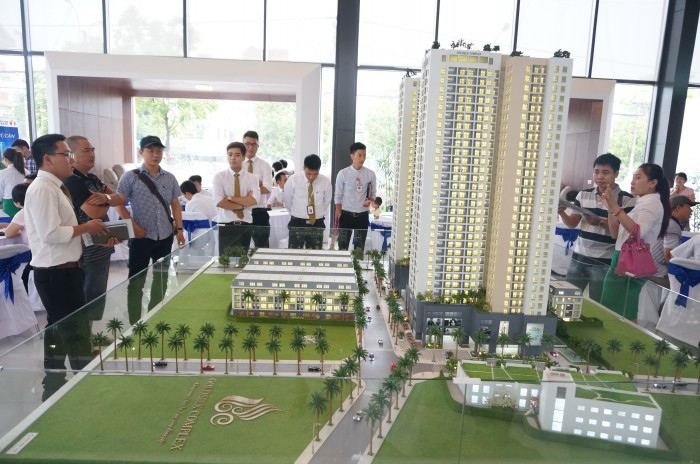Interest rates rise, home buyers face difficulties
In recent days, the announcement by commercial banks of increased interest rates for real estate loans has made those who have borrowed to buy apartments feel worried about the interest being higher than originally planned.
Meanwhile, for real estate investors and businesses, there is another concern about the issue of investment capital being gradually tightened, when banks' "appetite" for real estate loans is no longer "enthusiastic".
Recently, Eximbank announced that the interest rate for real estate loans, including loans for building houses, repairing houses, and buying apartments, is from 11%/year, an increase of 1% compared to before. In the financial market, some other banks such as OCB, SHB, VietCapital Bank... are lending to buy real estate with interest rates ranging from 11.5% - 12%/year, even up to 12.5%/year or more such as Sacombank, VietABank.
 |
| Rising interest rates have a significant impact on the home ownership dreams of low-income people. |
The increase in interest rates means that those who are taking out a home loan will have to adjust their financial plans because the monthly interest payments will also increase. Those who are dreaming of taking out a bank loan to find a place to settle down are also facing difficulties.
Not only did interest rates increase, but to prevent the risk of credit overheating and bad debt arising from the recent land fever, commercial banks only lent about 40% - 50% of the appraised real estate value, some banks even reduced the loan to about 30%, instead of 70% - 80% as before. This further narrowed the opportunity for low-income people to buy a house.
For investors, especially with medium and long-term loans for investment, consumption or real estate purchase, many experts have warned about interest rate risks. First, inflation is facing increasing pressure. With the trend of rising oil prices and adjustments in public service prices, it is inevitable that inflation will increase again, putting pressure on interest rates.
Second, the exchange rate has been continuously rising in recent days, which may force banks to increase input interest rates to maintain the attractiveness of deposits. Obviously, the increase in input interest rates will affect the output lending interest rates according to the principle of rising water.
According to Dr. Truong Huy Mai (RMIT), the policy of increasing interest rates for home loans aims to regulate the real estate market but unintentionally has a huge impact on home buyers with real housing needs. Commercial banks when lending for real estate have two main targets: customers who are real estate businesses and customers who are home buyers. The target group that suffers the most from the increase in interest rates and tightening of credit room is people with real housing needs.
"This group has little money and even fewer options for loan sources, so in the near future they will not be able to access housing products that are in short supply," said Dr. Truong Huy Mai.
Experts say that the State Bank needs to have preferential lending mechanisms and encourage investors to develop a number of affordable commercial housing projects (VND1-2 billion/unit) to meet the real housing needs of the majority of people today. There should be no credit room restrictions for investors who prioritize the development of this type of housing product.
For commercial banks, according to experts, there should be favorable lending policies for first-time home buyers and customers who buy houses for residential purposes, not for investment.

